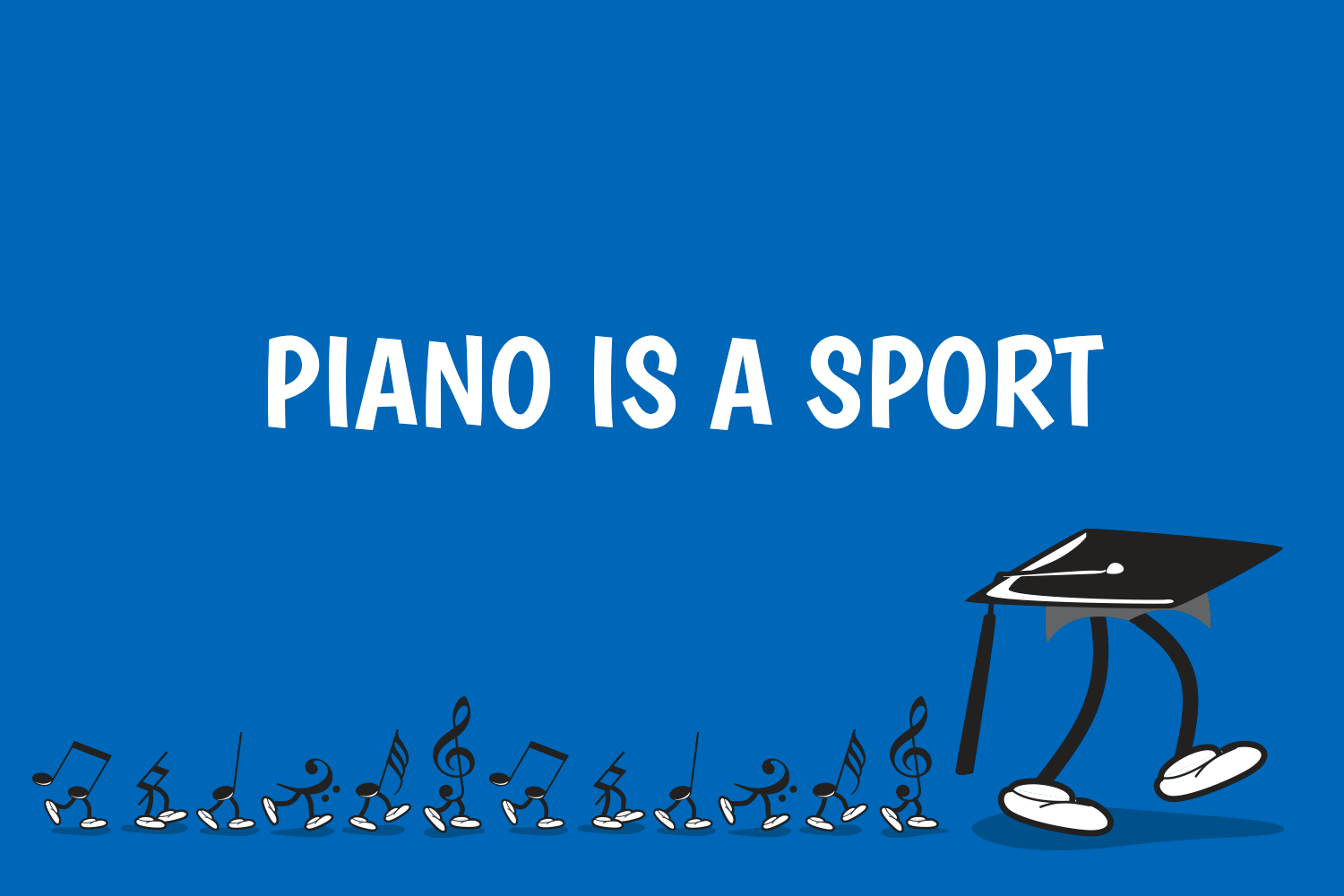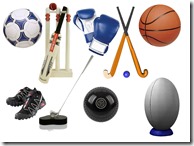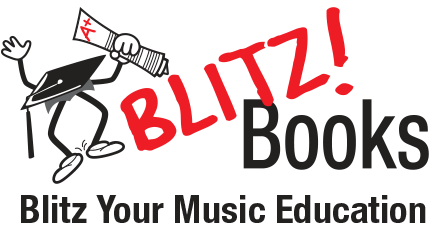Piano is a Sport


When it comes to playing piano – in fact any musical instrument – I think there are enormous similarities between sport and music. For example:
1. It is a physically demanding activity that takes hours of practice/training each week to do it well;
2. It is not possible to ‘cram’ – that is, ignore practice on a daily basis, and then practice madly the night before a game/an exam and still pull off a great result;
3. It requires muscle fitness, endurance, coordination, and a huge amount of mental focus.
In this wonderful sport-obsessed country of ours, even the least ‘sporty’ children participate in sport in some way, even if only at school. Therefore I have found that sporting analogies work extremely well with my piano students. Here are some of the most frequently used:
Getting a passage right
So many students practice piano by trying a passage over and over again, getting it wrong each time, persisting until they get it right… and then move on! The problem here is that the passage has been played many times wrong and only one time right. Yes, they have been practising, but they have been practising in the wrong notes. To make them understand this, I use a soccer analogy:
Imagine you have just finished some drills with your soccer team and now the coach wants you to practice kicking penalty goals. You kick the ball towards the goal…. And miss. You try again, and miss. You try again, and miss again. Fourth time, still no luck. Finally on the fifth try, the ball goes in. Now, would your coach tell you that was a fantastic practice session and send you home? NO. You missed the goal 80% of the time! The coach would make you stay and keep practising until you were kicking goals most of the time.
(This analogy also works really well with netball goals, basketball foul shots and tennis serves! It’s great if you can relate it to a sport that your student is actually taking part in.)
Not ignoring technical work
Most young students avoid playing scales because they do not grasp the relevance of doing so. I use the following tennis analogy:
Everyone loves to watch Lleyton Hewitt play tennis (when he wins). People enjoy watching the games. But no-one would enjoy watching his coaching sessions, when he is working on just his forehand over and over again – that would be boring. Imagine if Lleyton also thought that was boring, and didn’t do any practice? Imagine if he didn’t go to the gym and work out? He wouldn’t be a very good tennis player, and therefore no-one would enjoy watching his games.
Scales are the training and exercise that form your technique. Pieces are the ‘games’ that people can enjoy. You can’t have one without the other!!!
N.B. Professional musician Carolyn Worthy has blogged extensively on the tennis analogy. It’s fantastic – click here to read it.
Making a practice routine
Most children who take up piano will practice because their parents insist on it. I have done many other blog posts about how best to form a good practice routine. But what happens when the adult is in charge of their own practice?
Many mature age students, who are either taking up piano for the first time or returning to piano after many years’ break, think of it as an intellectual pursuit. They are taking up music – music! – and have a clear idea in their heads of what and how they would like to play, taking much pleasure in the thought of pursuing this musical goal.
Then real life sets in… busy days looking after family… practice only happens once a week or so, if that… and the frustration of not being able to play sets in. A sporting analogy is helpful here, one of personal training:
Imagine you want to run the half-marathon next year, but have not done any running since you were a kid. (Insert ‘play Fur Elise’ where it says ‘run the half marathon’). You engage a personal trainer, paying them each week to have a one-on-one session with you. What is that trainer going to expect you to do in between these sessions? Run. Run every day, a little more each time. Now, if you don’t ever manage to squeeze this running practice into your week, you would not get any fitter and would also not expect to gain much from the sessions with the trainer.
Breaking down practice
I have a student who competes in long jump at a state level, and we recently compared her training sessions to her piano practice:
| Long Jump | Piano Practice |
| Jumping from the foul line without a run-up | Don’t start from the beginning, concentrate on a small section |
| Jumping over an obstacle to achieve more height as well as length | Practicing a passage in a different way e.g. rhythms, to achieve evenness |
| Sprint training, to work on run-up | Scale practice, to improve technique for fast passages |
| Turning up to training wearing high heels* | Coming to lesson with freshly manicured long nails** |
*She has never done this, but understands now where the analogy fits in.
** She is 13. Need I say more?
Be your own practice coach
Piano practice is actually much harder than sport practice, because it is a solitary activity. In sport, the coach is there all the time, telling you what to do. In piano, the ‘coach’ is the piano teacher, and you only get one lesson per week with him/her; the rest of the time, you are on your own at home. So a practice coach analogy helps:
First of all, don’t skip piano practice. The same way you would never dream of missing basketball practice and letting the team down. The same way you reluctantly get out of bed at 5am to go to squad training at the pool, knowing that you won’t improve if you don’t do this and that the coach will really yell at you if you miss it.
Secondly, don’t slack off in your practice. Playing pieces once from beginning to end is as useful as a training session where your coach offers you a hot chocolate and a comfy chair. Just as you are expected to put in 100% effort and be exhausted at the end of sport practice, you should be prepared to engage fully in your piano practice, working on your weaknesses and constantly trying to improve.
Conclusion
Piano practice is one of the most highly disciplined activities that students do. It requires both mental and physical engagement, usually in a completely solitary and self-motivated environment.
If more piano students thought about their music practice from a sporting point of view, I think there would be a significant shift in both the perception of the purpose of practice, and the attitude to actually getting it done.

Dear Samantha,
Thank you for the awesome post. You mentioned that most children would practise and get it wrong initially. Once they get it right, they move on.
How many times should my daughter continue to practise once she gets it right? She could do an exam piece, scale and/or a sight reading perfectly on one day and fumbles the next.
Would appreciate it if you could advise us how to further support our children. Thank you.
It’s always tricky to know. In order to have a secure performance every time, repetition is the key, but only good quality repetition! I usually encourage my students to play something a minimum of three times IN A ROW correctly.
I think that piano is a sport and I am doing it for an argumentative essay for school. So I’m glad you have the right mind to think that piano is a sport and not just and activity you do.
Hi Penny, I would absolutely love to read your essay!